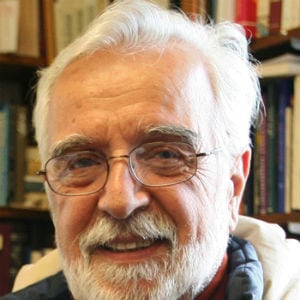George Saliba is a historian of Arabic and Islamic Science. He has been teaching at Columbia University since 1978. After completing a B.S. in Mathematics and an M.A. at the American University of Beirut, he received another M.A. and his doctorate from the University of California, Berkeley. Saliba studies the development of scientific ideas from late antiquity to early modern times, with a special focus on the transmission of astronomical and mathematical ideas from the Islamic world to Renaissance Europe during the fifteenth and sixteenth centuries. He received the History of Astronomy Prize from the Kuwait Foundation for the Advancement of Science in 1996, and the History of Science Prize given by the Third World Academy of Science in 1993. He has also been selected as Distinguished Senior Scholar at the Kluge Center of the Library of Congress (2005-6), and at the Carnegie Scholars Program (2009-10).
He is the author of Islamic Science and the Making of the European Renaissance (2007); Rethinking the Roots of Modern Science: Arabic Scientific Manuscripts in European Libraries, Occasional Paper, Center for Contemporary Arabic Studies, Georgetown University (1999); The Origin and Development of Arabic Scientific Thought (in Arabic, 1998); A History of Arabic Astronomy: Planetary Theories During the Golden Age of Islam (1994); The Astronomical Work of Mu’ayyadal-Din al-‘Urdi (d. 1266): A Thirteenth-Century Reform of Ptolemaic Astronomy (1990); From Deferent to Equant: A Volume of Studies in the History of Science in the Ancient and Medieval Near East in Honor of E. S. Kennedy (co-editor, 1987);The Crisis of The Abbasid Caliphate: An Annotated Translation of Tabari’s caliphate of al-Musta’in and al-Mu’tazz (862 – 869 A.D.) (1985); and Planispheric Astrolabes from the National Museum of American History (coauthor, 1984).


